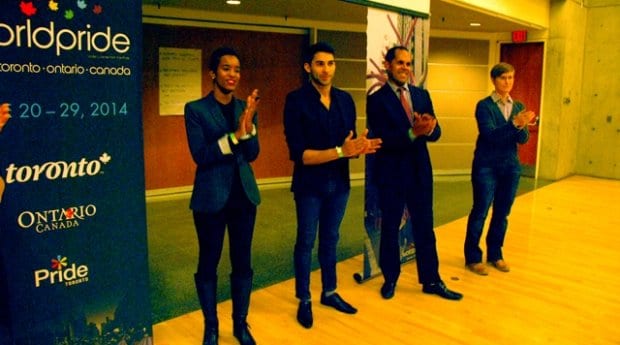Pride Toronto directors say that the mega-sized WorldPride festival had a $791-million economic impact on Toronto and the province.
At the organization’s annual general meeting (AGM) Oct 30, co-chair Sean Hillier also announced that Pride is running a surplus for the third year. It’s especially noteworthy given that WorldPride had the effect of increasing Pride Toronto’s budget by 152 percent. The increase was matched by a large uptick in revenue, sponsorships and donations.
Hillier specifically noted that the size of the event, which the board says drew two million visitors over the nine-day festival, generated more awareness of Pride than ever before, with national media covering the event. “I certainly don’t think there was a person in Canada who didn’t know the gays [were taking over],” he joked to the audience at the AGM.
“We got to stand really tall and proud this summer,” said Councillor Kristyn Wong-Tam, who opened the event.
The meeting saw a significant shakeup to the Pride board. Three-year veteran Susan Gapka, the first and only transgender representative on the Pride Toronto board, lost her reelection bid. Four new members — Carolynn Gludish, Alicia Hall, Michael Mirpuri and Tatum Wilson — joined the board, filling the empty seats left by Gapka, departing co-chair Hillier, Chad Simon and Mark Smith.
Gapka said that while winning is fabulous, losing is unpleasant. “I have contributed endless hours to this organization,” she said after the meeting, noting that she felt she acted as the social conscience of the board. “The organization will need to look to someone else to provide that social justice conscience.”
The new members are now looking forward to a term that may determine the future direction of Pride Toronto. In addition to ongoing strategic planning the organization is undertaking, they will also be sitting when a new executive director is hired. Kevin Beaulieu, who served as executive director for three years, announced his resignation in late August.
Co-chair Shelley Craig told Pride Toronto members that they have retained recruiting firm Four Corners to conduct the executive director search and that resumés are currently being accepted. Pride Toronto members, community stakeholders and sponsors will also be consulted as part of the search.
“We really want to honour the good work that is happening,” Craig says, adding that they hope to have the new executive director in place by early 2015.
Another challenge for the new board may come from the mayor’s office. During the municipal election campaign, mayor-elect John Tory said that he would vote to end city funding for Pride if Queers Against Israeli Apartheid (QuAIA) continued to march in the parade.
The new members of the board were diplomatic when asked how they would approach this potential challenge.
“I am not quite familiar with the actual group,” Hall said. “I would like to better understand their involvement in Pride.”
Similarly, Wilson says he’d like to better understand the Pride board’s position on the issue. “Also recognizing that a lot of things are said in the heat of the moment in an election — it’s obviously a discussion that will be ongoing, and I don’t think there’s a single yes-or-no solution to it.”
Mirpuri says that he knows Tory has been a vocal supporter of LGBT rights, adding that there will have to be education about what exactly Pride’s mandate is. Gludish says that both sides need to work together to understand the history of Pride Toronto in relation to QuAIA.
Though it feels that WorldPride was only a short time ago, attendees at the meeting also looked forward to 2015. In honour of the Pan Am Games that follow just two weeks after next year’s Pride, the members voted for the sports theme Get Out and Play.


 Why you can trust Xtra
Why you can trust Xtra


